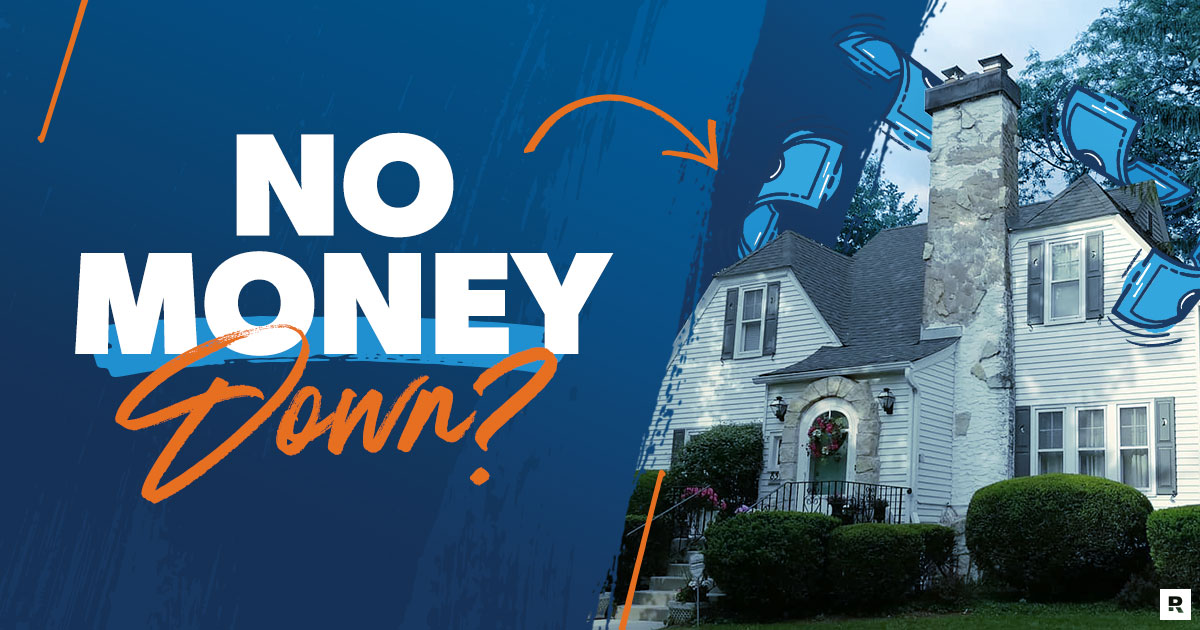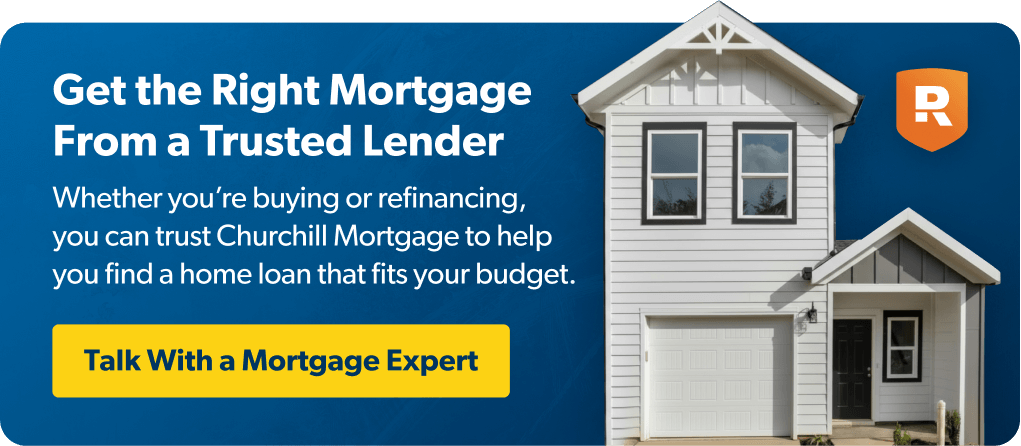
So, you’re ready to buy a house, but you don’t have enough cash on hand to make a hefty down payment.
We get it. With housing prices through the roof these days, it can be really hard to save up even a 5% down payment for a house. You’re probably getting antsy, especially if you’re the only one in your circle of friends who isn’t a homeowner. After all, we’ve been told all our lives that owning a home is the American Dream! It must be in the Constitution, right? (Fact check: It isn’t.)
So, can you buy a house with no money down? Well, there are ways . . . but it’s a bit more complicated than it sounds. And it’s definitely not the best way to go about getting into a home—not even as a last resort.
Just remember this life lesson from Jurassic Park: Just because you can do something doesn’t mean you should. (Okay, so you’re not creating dinosaurs in a lab, but no-money-down loans can have financially draining consequences that can eat at your future.)
Find a Mortgage Lender You Can Trust!
Let’s look at your no-money-down home-buying options—and why none of them are a good deal for you.
Can You Buy a House With No Money Down?
The short answer: Yes, it is possible to buy a home with no money down. Hold your horses, though, before you start looking at that three-bed, two-bath on Zillow.
You have to meet very specific requirements before you can qualify for the major no-money-down mortgage options. And each one comes with lots of extra fees.
So sure . . . technically speaking, there are no-money-down options where you can get your mortgage with little-to-no cost at the time. But they hurt you big-time in the long run.
How Can You Buy a House With No Money Down?
The most common no-money-down mortgages are government-backed loans, which are underwritten by the United States federal government. Translation: They’re insured by your fellow taxpayers. Since the government guarantees these loans, the bank doesn’t take on all the risk—and there are lots of risks for banks when they give out loans with nothing down.
Ask yourself this: Do you really want the government, which is well-known for its ability to handle money (sarcasm check), involved in your family’s biggest investment?
Plus, the no-money-down mortgages the government offers are terrible plans! Let’s take a look at them.
VA Loan
Members of the United States military can apply for a no-money-down mortgage through the Department of Veterans Affairs (VA). Making it easier for our veterans to buy a home sounds like a really cool thing, right?
Well, maybe not. VA loans have lots of strings attached and requirements to meet, including that you must be active duty, a veteran or the spouse of a veteran killed in the line of duty. On top of that, you’ll have to pay a funding fee of 1.4–3.6% of your loan amount.1 So, you end up paying more in the long run than you would have for the same house with a conventional loan.
USDA/RHS Loan
The United States Department of Agriculture (USDA) offers mortgages through the Rural Housing Service (RHS). As the name of the organization suggests, these are loans meant to help people in more rural areas of the country afford a house. Isn’t that nice?
Not really. The USDA has lots of rules attached to it, especially about where you can buy a home. Plus, since these loans are designed for rural areas, you’re most likely out of luck if you live in a big city. There are also limits on the size of the house you can get and the maximum amount of income you can make to still qualify—again, depending on where you live.2
FHA Loan
Mortgages from the Federal Housing Administration (FHA) are meant for first-time home buyers who may be having a hard time getting a conventional loan. This is technically not a no-money-down loan since the minimum down payment for an FHA loan is 3.5%. But that’s still pretty great, right?
Nope. FHA loans are subject to all kinds of additional fees and requirements, too, like up-front mortgage insurance premiums (MIP) of 1.75% of your total loan and an annual MIP payment of anywhere from 0.45 to 1.05% of your current loan balance.3
Should You Buy a House With No Money Down?
No. You should never buy a house with no money down. That’s it. That’s the answer.
Here’s the bottom line: If you can’t afford to put any money down on a home mortgage, you’re not in a financial position to become a homeowner. It’s probably still not a good idea if you can only put down a super small amount. That might be a harsh reality to face, but it’s true.
Think about it: There are other costs involved with homeownership (HOA fees, emergency repairs, homeowners insurance premiums, etc.) that may end up putting you in a bad spot financially. If you can’t cover a down payment, you won’t be able to handle those costs, either.
And again, do you really want to rely on politicians in Washington to take care of your loan?
So, what’s the best way to buy a house? With cash. 100% down. Trust us, it can be done. We get that the 100% down plan isn’t for everyone, though, so getting a mortgage is okay if you do it the right way.
That means saving up a good down payment, preferably of at least 20% so you won’t have to pay private mortgage insurance (PMI) as part of your monthly payment. PMI is insurance that protects the lender—not you—in case you stop making payments. Lenders require it for all home buyers who put less than 20% down.
A 5–10% down payment will work, especially if you’re a first-time home buyer, but be prepared for the PMI payments. And remember, the more you put down, the less you have to borrow—and the faster you can pay that mortgage off and be completely debt-free! And if you're considering using your 401(k)? Make sure you know the downsides.
No matter how much you’re putting down, go for a fixed-rate 15-year mortgage with a monthly payment that’s no more than 25% of your take-home pay, including principal, taxes, insurance, PMI and any HOA fees.
One more thing: You shouldn’t buy a home unless you’re out of debt and have an emergency fund with 3–6 months of expenses saved. That way, you won’t have a crisis on your hands the first time something goes wrong with a refrigerator or HVAC unit (and trust us, something will go wrong).
You can absolutely make all this happen, but you’ll need to be intentional about it. Get on a budget, get out of debt, and set some long-term financial goals. And by the way, there’s nothing wrong with renting while you work your plan and save up a down payment. Millions of people have gotten into homes this way, and you can too!
Your Guide to Saving for a Down Payment Fast
Break your savings goal into simple steps so you can buy a home you love faster and with confidence.
Buy a Home the Right Way
When you’re ready to join the homeowning crowd, work with a lender who cares about you and your financial goals. We recommend our friends at Churchill Mortgage. They can help you find a mortgage you can afford and pay off quickly so you can use your money on more important things.
You’ll also need a real estate agent who can help you find a home that’s perfect for your family and your budget. That’s where our RamseyTrusted® agents come into play. They’re part of our RamseyTrusted program—a network of agents in your area that we partner with to take care of your individual needs the Ramsey way.
Did you find this article helpful? Share it!

We Hear You!
We’re considering adding the ability to save articles to your Ramsey account.




